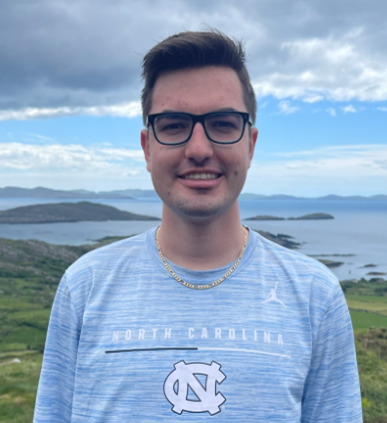As a UNC freshman, Nicholas Ilgandi was a familiar face around UNC Kittner Eye Center. By graduation, the well-liked, motivated undergraduate’s primary role within the department had expanded to assisting a wide range of faculty-led clinical studies serving as a Clinical Research Assistant. Nicholas is now a first-year medical student at Lincoln Memorial University (Harrogate, TN). Four years of working in UNC Ophthalmology administrative and research roles gave the aspiring physician a timely understanding of how direct patient care and clinical research are inter-related and dually advance patient treatment and outcomes in any medical specialty. 
At Kittner Eye Center, Nicholas’ contributions to workflow exposed him to how comprehensive eye exams critically inform diagnostic care and improve patient outcomes, particularly in children.
He noted: “In the clinic, I saw how greatly pediatric screening benefitted diagnosis and spared children with early-stage disease of advanced treatment. Once I began assisting faculty with their clinical studies, I gained a much deeper understanding of how critical clinical investigation is to all medical disciplines in order to advance and improve patient care.”
Impressed by Nicholas’ work around Kittner Eye Center, clinical research faculty encouraged his hire as a Clinical Research Assistant in his latter college years. Nicholas assisted a range of faculty-led clinical studies, interacting with patients in an expanded capacity through taking vital signs, performing visual acuity and refractive tests (eg, lensometry, biometry), obtaining patient consent, and conducting follow-up with research participants.
Nicholas assisted UNC Ophthalmology drug and gene delivery translational scientist Zongchao Han, MD, PhD, with conducting experiments, learning ophthalmology lab culture and techniques in the process.
Dr. Han noted: “Some of Nicholas’ most distinguishing qualities are his drive and long-term vision. As an undergraduate student in my laboratory, Nicholas was effective at the bench and rapidly familiarized himself with the most relevant work in the lab.”
Nicholas also worked with pediatric eye specialists Assistant Professor Michelle Go, MD, and Assistant Professor Kathy Whitfield, MD, on outcomes-based studies. He conducted data collation and analysis for these two faculty researchers, for large-scale studies assessing approaches to improving clinical practice in treating pediatric amblyopia (lazy eye), as well as procedural intervention with implantable lenses (STAAR) to improve pediatric myopia.
Dr. Go stated: “Nicholas was very organized and responsible in his role as research coordinator for our two pediatric ophthalmology studies. He was a valuable team member as we started our involvement in a multicenter NIH-funded randomized clinical trial and impressed me with a level of professionalism uncharacteristic for someone so young.”
UNC Ophthalmology Clinical Research Coordinator Eliza DuBose worked closely with Nicholas when he was hired to support several studies as a Clinical Research Assistant. She noted:
“Nicholas really impressed us with how he adapted to the many roles he took on in one year. He rapidly acquired working knowledge of medical terminology and quirky technology, which is complex for glaucoma research. He is a promising future medical professional who can engage study patients of all ages, getting them onboard and keeping them focused during lengthy research sessions. He was so valuable to our team while working with our smallest and shyest children. His easygoing manner and patience clearly made him a favorite (and sometimes only!) one that could keep their attention.”
In the fall of his first year in medical school, Nicholas was awarded a National Health Service Corps (NHSC) scholarship, providing full tuition and monthly stipends over four years of medical school. Once he has completed residency, the scholarship requires him to enter primary care practice in a rural or underserved area. Nicholas is likely to pursue internal medicine for residency, which is a primary care discipline in well-suited his scholarship service.
Working within the state’s flagship hospital system, Nicholas was exposed to a wide range of eye conditions treated and researched in patients from across North Carolina. Over four years, he witnessed how patient care for defined groups of individuals produces outcomes data that inform the aims of population-based clinical research. His experience interacting with patients of all backgrounds at UNC Kittner Eye Center influenced his aspirations in medicine to pursue prevention-focused primary care that focuses on screening and comprehensive exams to diagnose and treat disease in early-stage development.
Nicholas concluded: “Being named a [NHSC] scholar is an honor and an amazing opportunity. I am very passionate about applying my education and experiences to impact underserved communities and look forward to helping bridge gaps in medicine in the communities where I will work.”
